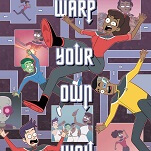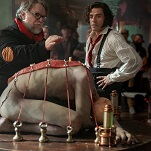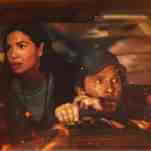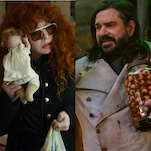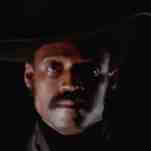I don’t think I’ve loathed a sitcom character more than Jenna James, but I’m also strangely very much on her side. This week, Jenna’s story gets even more complicated, as her job is threatened. She briefly becomes, with the worst motivations possible, a good person.
I’ve never taken Thomas Hobbes too seriously—he’s so cynical and depressing, and even though The Leviathan might be one of the only poli-sci texts I read in class, that’s largely because it was assigned earlier in the year—but his philosophy works pretty well for the entire mood of Getting On. Human life is “solitary, poor, nasty, brutish, and short”—which, when you’re in the extended-care ward of a poorly funded hospital, sounds about accurate.
“Dumped” is a little more tragic than funny. Molly Shannon guest-stars, and I was expecting her character to be comedic. She’s not. She’s maybe the most upsetting character in the whole episode—a woman who tries to get Jenna to understand her mother’s pain, only to be told, very brusquely, that her mother is off of chemotherapy because the cancer has spread too far. It’s the kind of horrible, egocentric blunder that reminds me of The Office. And much like that show, Getting On is revealing itself to be a show more about its tyrannical middle manager than it is about the mild-mannered, bored protagonist.
But Getting On isn’t The Office, though it copies its style. The characters are drawn differently, and in some ways, they’ve got more agency. Getting On has this tension between how much power characters have and how much they think they have, or how much they wield. The way they wreak these little attempts to seize agency on each other and on the patients in the ward ends up driving the story.
Jenna’s whole story is about power, for example. The way she terrorizes her nurses, only to shrink back to them, practically cowering, when her superiors reprimand her, speaks to me of a woman who feels so powerless that she responds by squeezing out unnecessary control of the few things she’s in charge of. Like that raffle basket, or the interns whom she directs through a rectal exam. A rectal exam! A literal “up-yours,” a childish insult along the lines of sticking your tongue out. It has the ability to pass, on the surface, as a regular medical procedure, and the scene is milked for laughs more than character development, but it relies on Jenna’s bizarre, indomitable need to bully everyone else around her.
And then sometimes, when she’s motivated by job security, she uses her powers for good: Even though I know she’s terrible, I was rooting for her when she defended Dawn and put that snotty ER doctor in his place. I don’t know where this story goes for Jenna from here on out, but I like how it’s complicated the character so much already, in just four half-hour episodes.
Niecy has an interesting story with agency, too: She’s theoretically the least-powerful person on staff, but in some ways, the way that she so casually avoids responsibility and the stability she feels within her family makes her one of the most powerful people in the hospital. Compare this to Dawn’s frenetic energy, which has the weight of some authority but is also constantly undercut by her own neuroses.
That being said, Dawn gets some spine in this episode, which I didn’t quite expect. Dawn’s disgusted face when Marguerite sucks up to Patsy is one of the funniest of the series. I love that Dawn is getting attitude—she even yells at Jenna! And she uses some of that agency to give gifts, which offers such dimension to the character. It’s possible that this season will be a season of transformation for her, from a character who is very clearly sidelined to one who has some ability to have an effect on other people—even if that’s just to wreak havoc. Her relationship with Patsy seems to have made her more confident—even if he is gay (or is he?).
I didn’t find this episode as well-crafted as last week’s, but this is still a consistently engaging and thought-provoking show. It has the ability to create laughter out of just a facial expression or two, because its characters are so well-established. I’m getting more and more invested in how this finale affects the ward.
Stray observations:
- “Oh, sure. I’ll nominate Dawn for the Who Cares award.” It’s worth all the setup for that perfect delivery.
- Jenna James has perfected the Gold Standard of Stool Samples.

























